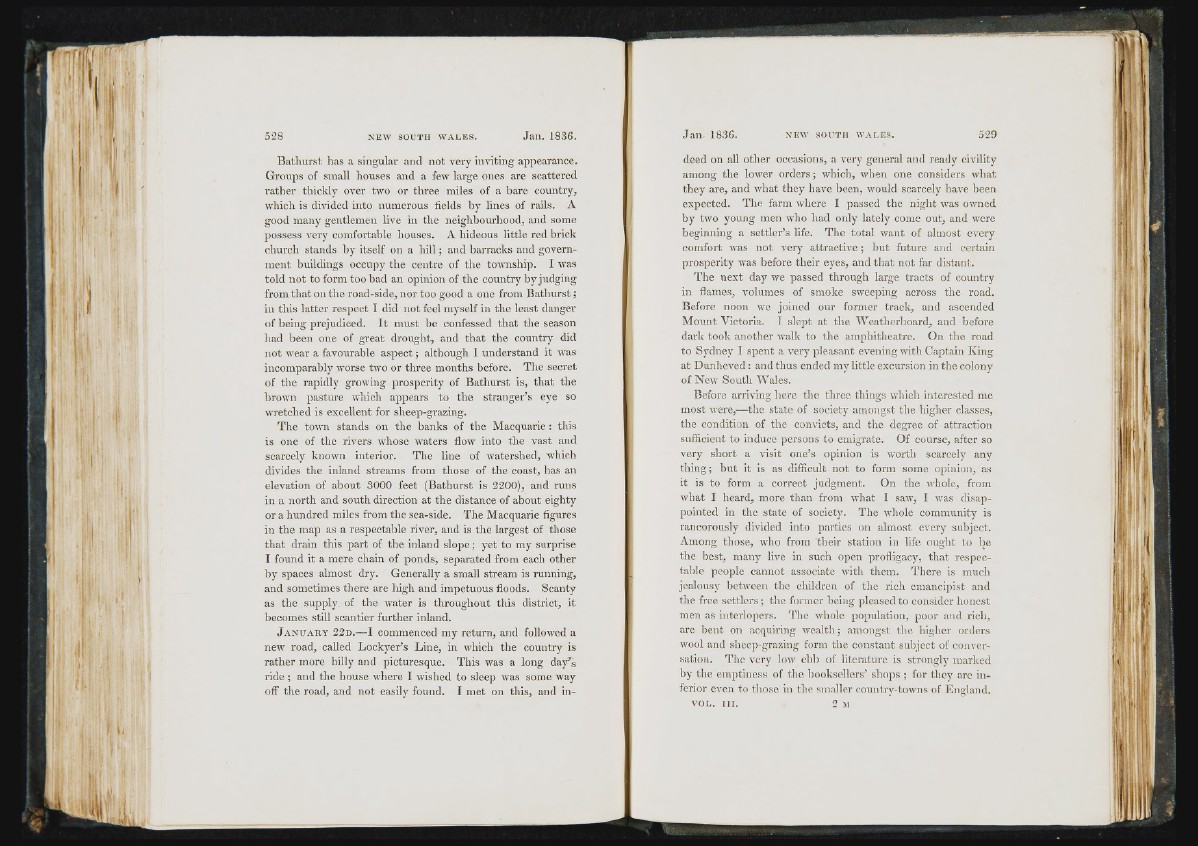
i l . i .
Bathurst has a singular and not very inviting appearance.
Groups of small houses and a few large ones are scattered
rather thickly over two or three miles of a bare country,
which is divided into numerous fields by lines of rails. A
good many gentlemen live in the neighbourhood, and some
possess very comfortable houses. A hideous little red brick
church stands by itself on a h ill; and barracks and government
buildings occupy the centre of the township. I was
told not to form too bad an opinion of the country by judging
from that on the road-side, nor too good a one from Bathurst;
in this latter respect I did not feel myself in the least danger
of being prejudiced. It must be confessed that the season
had been one of great drought, and that the country did
not wear a favourable aspect; although I understand it was
incomparably worse two or three months before. The secret
of the rapidly growing prosperity of Bathurst is, that the
brown pasture which appears to the stranger’s eye so
wretched is excellent for sheep-grazing.
The town stands on the banks of the Macquarie: this
is one of the rivers whose waters flow into the vast and
scarcely known interior. The line of watershed, which
divides the inland streams from those of the coast, has an
elevation of about 3000 feet (Bathurst is 2200), and runs
in a north and south direction at the distance of about eighty
or a hundred miles from the sea-side. The Macquarie figures
in the map as a respectable river, and is the largest of those
that drain this part of the inland slope; yet to my surprise
I found it a mere chain of ponds, separated from each other
by spaces almost dry. Generally a small stream is running,
and sometimes there are high and impetuous floods. Scanty
as the supply of the water is throughout this district, it
becomes still scantier further inland.
J a n u a r y 2 2 d .— I commenced my return, and followed a
new road, called Lockyer’s Line, in which the country is
rather more hilly and picturesque. This was a long day’s
ride ; and the house wliere I wished to sleep was some way
off the road, and not easily found. I met on this, and indeed
on all other occasions, a very general and ready civility
among the lower orders; which, when one considers what
they are, and what they have been, would scarcely have been
expected. The, farm where I passed the night was owned
by two young men who had only lately come out, and were
beginning a settler’s life. The total want of almost every
comfort was not very attractive; but future and certain
prosperity was before their eyes, and that not far distant.
The next day we passed through large tracts of country
in flames, volumes of smoke sweeping across the road.
Before noon we joined our former track, and ascended
Mount Victoria. I slept at the Weatherboard, and before
dark took another walk to the amphitheatre. On the road
to Sydney I spent a very pleasant evening with Captain King
at Dunheved : and thus ended my little excursion in the colony
of New South Wales.
Before arriving here the three things which interested me
most were,—the state of society amongst the higher classes,
the condition of the convicts, and the degree of attraction
sufficient to induce persons to emigrate. Of course, after so
very short a visit one’s opinion is worth scarcely any
thing; but it is as difficult not to form some opinion, as
it is to form a correct judgment. On the whole, from
what I heard, more than from what I saw, I was disappointed
in the state of society. The whole community is
rancorously divided into parties on almost every subject.
Among those, who from their station in life ought to be
the best, many live in such open profligacy, that respectable
people cannot associate with them. There is much
jealousy between the children of the rich emancipist and
tlie free settlers ; the former being pleased to consider honest
men as interlopers. The whole population, poor and rich,
are bent on acquiring wealth; amongst the higher orders
wool and sheep-grazing form the constant subject of conversation.
The very low ebli of literature is strongly marked
by the emptiness of the booksellers’ shops ; for they are inferior
even to those in tlie smaller country-towns of England.
VOL . I I I . 2 M
r i